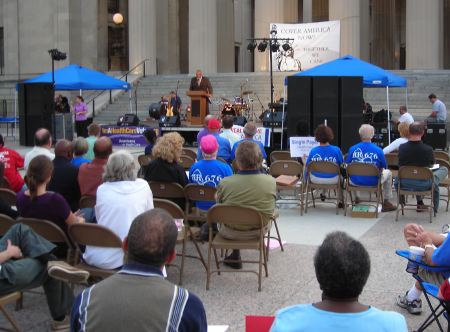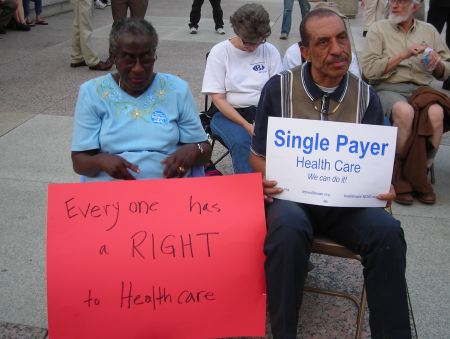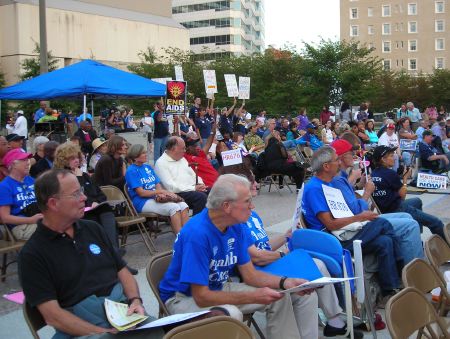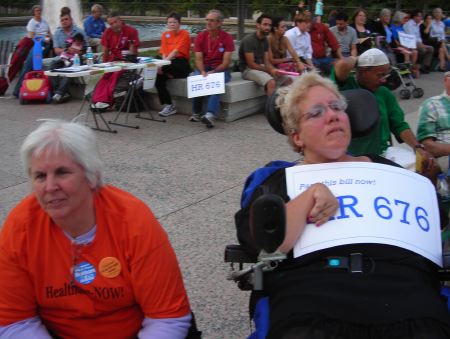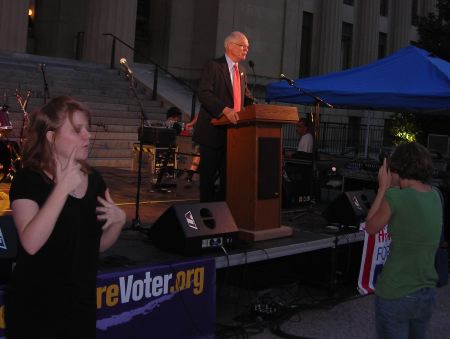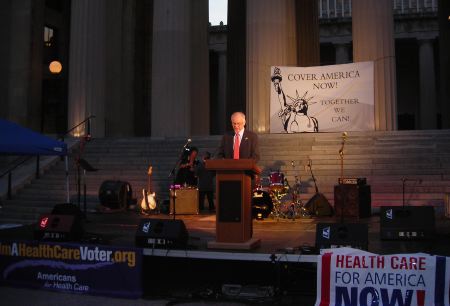News
Dr. Garrett Adams – Healthcare Rally, Nashville, 10/6/08 – Transcript
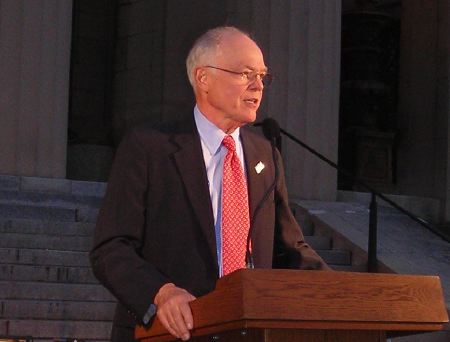
Health Care Rally
Nashville, Tennessee
October 6, 2008
Garrett Adams, MD, MPH
Physicians for a National Health Program
www.PNHP.org
Hello Nashville! Nashville, home of my parents, my grandparents, and my great-grandparents. Nashville, where I was born and where I learned the essential skills of providing medical care for children.
Congratulations on hosting an historic Presidential Debate.
Five years ago an article in the Journal of the American Medical Association entitled, The Physicians Proposal for a National Health Plan, changed my life. When I endorsed this plan, I was one of 8,000 physician endorsers. Today we are over 15,000 physicians, medical students and health professionals who support single-payer national health insurance in the Physicians for a National Health Program, a non-profit research and education organization.
Senator McCain, Senator Obama, and all candidates for public office, I speak for physicians today to protest a national health care payment system that yearly snuffs the life of 22,000 Americans,
A system that yearly puts over a million Americans into bankruptcy – three quarters of whom faithfully paid insurance premiums.
A system that enriches shareholders and corporate executives, rather than pay the medical expenses of sick patients.
A system that wants to insure young healthy people and to deny coverage to the sick and elderly in order to maximize profits.
A system that pays multimillions to its executives.
A system that offers bonuses to employees that can find loopholes in policies that will allow cancellation or denial of claims.
A system that does not insure people with pre-existing illnesses.
A system that allows a faithful worker whose illness forces him or her to lose their job, to also lose health care coverage and the ability to get future health insurance.
A system that forces people to choose employment, based on availability of health benefits and to remain in jobs they don’t like just to keep their “benefits” – health care hostages.
A system whose profits rely on increasing premiums, deductibles, and co-pays, and insuring healthy people while denying medical claims for the sick.
A system with no control over health care costs. We soon will spend one of every five dollars on health care, more than twice the average of other developed nations, all of whom provide universal national health care, yet we rank 37th worldwide in our system’s efficiency.
A system that allows the pharmaceutical industry to charge Americans 40% more for drugs than other countries charge.
Now listen to this, Senators McCain and Obama — A system that is carefully shielded and supported by politicians, who are rewarded with millions for their election campaign chests.
There is a cure for this sick health care system. The cure is surgery – Surgery, to remove the health insurance companies and to exert control over the pharmaceutical industry.
The health insurance industry is the problem with our health care system. It has not done, and it cannot do, anything positive for the delivery of health care in this country. For-profit, market-based health insurance is a failed and unsustainable experiment. It cannot work. When an experiment fails, the wise course of action is to abandon it and to begin a new plan.
The Declaration of Independence guarantees to American citizens the right to life, liberty, and the pursuit of happiness. Without health care we have none of these. A responsible government should provide health care to its citizens, just as it provides fire protection, police protection, and education. Americans deserve good health. We deserve to be and we can be a healthy nation, but not so long as we carry the added weight of the health insurance industry in provision of health care.
To cure our health system we need to operate, to excise the profiteering aspects of it; we also need to fill a prescription. The prescription is House Resolution 676, sponsored by Congressman John Conyers of Michigan, a bill now in the US Congress that will provide comprehensive universal health care in the US, publicly financed, but privately delivered, guaranteeing complete free choice of doctor and hospital. The bill has 93 co-sponsors, more than 20% of the Congress, the most support of any health reform bill in Congress.
Passage of single payer national health insurance legislation is politically feasible.
HR 676 has been endorsed by the Kentucky and New Hampshire Houses of Representatives, the New York State Assembly, dozens of cities and counties from Baltimore to San Francisco and from Warren County, Tennessee to majority-Republican Rensselaer County in New York state.
Churches have endorsed single payer national health insurance. The Presbyterian Church, the Unitarian-Universalists, the Methodists, the Episcopalians, the United Church of Christ, all have formal statements endorsing single payer NHI.
Recently the US Conference of Mayors, representing over 1,000 cities with populations over 30,000, unanimously adopted a resolution in support of HR 676.
Union support for HR 676 grows daily and includes 39 state AFL-CIO federations and 116 Central Labor Councils.
Fully two thirds of Americans support this plan, as well as the majority of physicians.
Numerous federal and state studies have demonstrated the economic necessity and viability of single payer plans.
Today you and I are part of a new American movement to demand our government jettison all forms of profiteering in the provision of health care. That health care financing become public. That all Americans receive comprehensive, medically necessary health care free from financial barriers. Incremental change will not work. We need a transformational change.
This is a movement of the people as surely as the women’s suffrage movement that gave women the right to vote, the civil rights movement, or other human rights movements.
Join the movement. We need you. We need your voices and your feet.
Listen to us, Senators McCain and Obama! Listen to us! We say
Health Care for All Now!
Can you hear us?
Health Care for All Now!
Health Care for All Now!
PNHP Rally – Nashville, Tennessee, October 6, 2008
On Monday, Oct. 6, the evening prior to the Presidential Debate at Belmont University, a healthcare rally was held in Nashville, Tennessee. The rally was sponsored by a broad coalition including Tennessee Health Care Campaign, SEIU, TN AFL-CIO, USW, Tying Nashville Together, Tennessee Alliance for Progress, Healthcare-NOW Nashville, and others.
Speakers include Dr. Garrett Adams of PNHP-Kentucky. Below is a video of Dr. Adams’s speech.
Large, high quality video of speech: Download (220 MB)
Kentucky House passes resolution urging Congress to enact HR 676
In Frankfort on February 7, 2007, the Kentucky House of Representatives passed HR 81, a resolution endorsing HR 676, the National Health Insurance Act. Introduced by the Honorable Joni L. Jenkins (D), District 44 (Jefferson), the resolution was adopted by voice vote. Kentucky is the first state in the union to pass such legislation.

Left to right: Rep. Joni Jenkins, Sponsor of HR 81, Peggy Kidwell, Harriette Seiler, Dr. Garrett Adams, Kay Tillow, Rev. David Bos
The resolution itemizes health care issues facing the state and the nation, and concludes with the following statement:
NOW, THEREFORE,
Be it resolved by the House of Representatives of the General Assembly of the Commonwealth of Kentucky:
Section 1. The House of Representatives of the Kentucky General Assembly respectfully urges the United States Congress to enact H.R. 676, the United States National Health Insurance Act, sponsored by Representative John Conyers in the United States House Of Representatives for the 110th Congress.
Section 2. The Clerk of the House of Representatives is directed to transmit a copy of this Resolution to the President of the United States and the members of the Kentucky Congressional Delegation.
The full text of the resolution is available in a Word document at
http://www.lrc.ky.gov/record/07RS/HR81/bill.doc.
Kentuckian Kay Tillow Receives Dr. Quentin Young Health Activist Award

Kay Tillow
A standing ovation and prolonged applause followed Dr. Quentin Young’s announcement that PNHP’s Dr. Quentin Young Health Activist Award was being given to Kay Tillow, Coordinator of Kentuckians for Single Payer Healthcare. The award reads, “In the finest tradition of activism for social change, she has brought the single payer vision to new constituencies.”
Earlier in the day on November 4, 2006, 250 members heard Tillow address the annual meeting. She described her work convincing labor unions across the United States of the importance of formal endorsements of Congressman John Conyers’s United States Health Insurance Act, HR 676.
As a result of her work, hundreds of American unions with hundreds of thousands of members have signed resolutions supporting a single payer national health insurance plan for the United States.
Her grassroots vision of achieving formal HR 676 endorsement resolutions from labor, all the way from small individual union halls to state UAW’s, has been an inspiring victory in the single payer movement. It provides a powerful political tool to convince policy makers that the single payer plan is the solution to our nation’s health care dilemma.
Kay Tillow is the Executive Director of the Nurses Professional Organization and Coordinator of Kentuckians for Single Payer Healthcare.
Following Kay Tillow’s award, Drs. Rob Stone, Chris Stack, and Aaron Carroll were recognized for bringing the single payer vision to new constituencies in Indiana.
Louisville Metro Council Endorses HR 676, Single Payer National Health Care
On October 12, the Louisville Metro Council passed a resolution endorsing HR 676, Congressman John Conyers’ single payer U. S. National Health Insurance Act. The vote was 14 to 9. Health and Human Services Chair and District 3 Councilwoman Mary Woolridge sponsored the resolution and guided it through committee and floor debate. Woolridge spoke passionately of her concern for the 85,000 residents of Louisville Metro who suffer from having no insurance.
Councilwoman Madonna Flood told of the death at age 42 of a constituent who didn’t go to the hospital with his chest pain because of his lack of insurance. She called that tragedy “a crime” and stated that if we could “put a man on the moon in 1969, then we can do better at protecting people–we can’t afford to let another citizen die.”
Councilwoman Vicki Welch responded to Councilman Heiner’s assertion that the Metro Council had done something on health care when it ran ads to try to get children enrolled in the Kentucky Children’s Health Insurance Plan. Welch, a registered nurse, said: “KCHIP is not enough–when parents in low income families are not covered, the family is devastated by illness.”
Councilwoman Tina Ward-Pugh stated that this resolution should “fire a signal to Congress” that it must do something on health care.
Councilman Tom Owen told of the common practice of families buying the insurance for their adult children in their 20’s and 30’s because their jobs do not provide the coverage. He said: “We are here tonight with a message to say there is a crisis. The grassroots movement has been urging us for months to recognize it.”
Owen was referring to the dozens of addresses to council that told of the suffering and deaths from lack of insurance or insurance too costly and too skimpy to provide security. Joan Dubay and the Metro Council Committee of Kentuckians for Single Payer Healthcare organized those addresses and a massive grassroots campaign that involved hundreds.
Councilman Bob Henderson said that this resolution will “start the conversation to keep public health and safety” in the forefront. Councilwoman Cheri Bryant Hamilton said the issue is “protecting all the people–not just the big people.” Councilpersons Jim King, Dan Johnson, Barbara Shanklin, and Leonard Watkins asked to be added as sponsors of the resolution.
Councilwoman Julie Raque Adams quoted the Fraser Institute and the Pacific Research Institute attributing long waits, appalling conditions, and massive taxes to the Canadian single payer health system.
Adams was quoting from biased sources according to the Physicians for a National Health Program of Chicago (www.PNHP.org). In their Summer 2005 Newsletter PNHP says of the Fraser Institute: “Their research is so bad that not even pro-privatization Canadians bother to cite their work.” PNHP asserts that both the Fraser Institute and Pacific Research Institute are funded by the wealthy far-right Bradley Foundation and that both publish unreviewed “crackpot studies.”
Councilman Kelly Downard, with a second by Councilwoman Ellen Call, sought to send the resolution back to committee. That failed on a vote of 14 to 11.
Shortly before the debate drew to a close, Councilwoman Woolridge announced that 13 Councilmembers had signed on as cosponsors. The debate ended with a roll call vote. Watkins, Shanklin, Woolridge, Tandy, Bryant Hamilton, Unseld, Owen, Ward-Pugh, King, Blackwell, Welch, Henderson, Johnson, and Flood voted “yes.” Fleming, Kramer, Downard, Adams, Heiner, Benson, Engel, Hawkins, and Call voted “no.” Stuckel abstained, and Peden voted “present.”
Louisville joins Baltimore (MD), Erie (PA), Morehead (KY), Oberlin (OH), Lorain (OH), University City (MO), Warren County (TN), and Lorain County (OH) as local governments that have called on Congress to pass HR 676 to resolve the national health care crisis.
The text of Metro Council Resolution R 146-9-06
RESOLUTION NO. R 146-9-06, SERIES 2006
A RESOLUTION IN SUPPORT OF THE UNITED STATES NATIONAL HEALTH INSURANCE ACT.
SPONSORED BY: Councilwoman Mary Woolridge
Whereas, every person in Metro Louisville and in the United States deserves access to affordable, quality healthcare; and
Whereas, over 45.8 million Americans, including 85,000 residents of Metro Louisville, live daily without healthcare coverage; and
Whereas, those insured now often experience burdensome medical debt and sometimes life-threatening delays in obtaining healthcare; and
Whereas, one-half of all personal bankruptcies are due to illnesses or medical bills; and
Whereas, administrative costs for our current healthcare system consume approximately thirty percent (30%) of United States healthcare spending, with rising costs contributing to decreased international business competitiveness
and massive layoffs; and
Whereas, United States Representative John Conyers has introduced
House Resolution 676, (hereinafter referred to as HR 676), The United States National Health Insurance Act, which would provide healthcare to all; and
Whereas, the goal of HR 676 is to ensure that all Americans have access, guaranteed by law, to the highest quality and most cost-effective healthcare services regardless of their employment, income, or healthcare status; and
Whereas, HR 676 will cover all medically necessary services, including primary care, inpatient care, outpatient care, emergency care, prescription drugs, durable medical equipment, long term care, mental health services, dentistry, eye care, chiropractic, and substance abuse treatment; and
Whereas, HR 676 will give patients their choice of physicians, providers, hospitals, and clinics with no co-pays or deductibles in a publicly financed, privately delivered system;
NOW THEREFORE, BE IT RESOLVED BY THE LEGISLATIVE COUNCIL OF THE LOUISVILLE/JEFFERSON COUNTY METRO GOVERNMENT (THE COUNCIL) AS FOLLOWS:
SECTION I: The Metro Council of Louisville, Kentucky hereby supports and endorses HR 676, “United States Health Insurance Act;” and respectfully requests our elected federal officials to endorse and adopt HR 676; and the Council Clerk is authorized and directed to forward copies of this Resolution to our federal legislators and to our area state legislators to enlist their support of this vital piece of legislation.
SECTION II: This Resolution shall take effect upon its passage and approval.
Kathleen J. Herron Kevin J. Kramer
Metro Council Clerk President of the Council
Jerry E. Abramson Approval Date
Mayor
APPROVED AS TO FORM AND LEGALITY:
Irv Maze
Jefferson County Attorney
46 million uninsured focus of meeting
–via The Louisville Courier-Journal
Mandatory insurance among plans debated
By Laura Ungar
The Courier-Journal
Celeste Vanskike has worked at preschools for 25 years but can’t afford health insurance — meaning she’s had to put off doctor visits and leave a thyroid condition untreated.
“Here I am, I’ve got a good work ethic and I’m barely eking out an existence. … And there’s so many of us out here without insurance,” said the 56-year-old Louisville woman, who earns less than $20,000 a year. “More has to be done. It has to be brought to light.”
Yesterday, the Kentucky Medical Association focused its annual meeting on the estimated 46 million uninsured Americans and more than half a million uninsured Kentuckians.
Called “Breaking the Barriers,” the meeting attempted to dissect the problem and present possible solutions, including a Massachusetts program mandating residents have insurance, an American Medical Association plan promoting “incremental” health-care reform, and a national health-care system like the one in Canada.
“For a number of our members, the issue of the uninsured in the state is a bigger problem” than the rising cost of malpractice insurance, said Daniel W. Varga, chief medical officer for Norton Healthcare and outgoing president of the KMA.
Dr. Stephanie J. Woolhandler, an associate professor at Harvard Medical School and co-founder of Physicians for a National Health Program, said America is morally bound to care for the uninsured. According to the Institute of Medicine, a nonprofit organization that advises the government on medical issues, about 18,000 Americans die each year because they lack insurance.
“We don’t just live in an economy,” she said. “We live in a society and we have a responsibility to protect and care for each other.”
Kentucky below average
About 14 percent of Kentuckians, and a similar portion of Indiana residents, lack health insurance. Although these figures are below the national average, speakers said the problem in Kentucky is compounded by poverty and one of the unhealthiest populations in the nation.
There’s also an increasing number of middle-class, underinsured Kentuckians facing some of the same problems as the uninsured in getting the care they need, said Michael E. Samuels, a University of Kentucky professor and rural health expert.
He pointed to statistics from a recent telephone survey of 2,100 households by the University of Kentucky, the University of Louisville and the Kentucky Long-Term Policy Research Center. It showed that 54 percent of uninsured residents and 21 percent of insured residents skipped a medical test because of cost.
“The one thing we don’t want to do is prevent people from getting necessary preventive care and the necessary screenings,” he said.
Samuels said several trends are converging: Employers are shifting more insurance costs to workers, fewer small companies offer health benefits and a growing number of personal bankruptcies are linked to medical costs.
Those most likely to be among the uninsured include low-wage workers, young people entering the labor force and those who retire early. About half of Kentuckians with no health insurance have done without it for more than three years, the survey found.
…
Financial incentives
Woolhandler said there are many financial reasons for adopting national health care. For instance, she said, health-care costs for auto companies were $1,309 per car for Ford but only $97 per car for Toyota in Japan, which has a system of universal health coverage.
She said administrative health-care costs have risen dramatically in the United States and are much lower in countries with national health care. Meanwhile, life expectancy is higher in several of these countries.
She acknowledged problems with national systems, such as some waits for care in Canada. But she said the percentage of people with unmet health-care needs is about the same for Canadians as for insured Americans.
“The problems have been grossly exaggerated in the U.S. media,” Woolhandler said.
…
Link to Full Original Article
Dr. Steffie Woolhandler Visits Kentucky
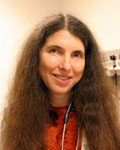
Steffie Woolhandler
Steffie Woolhandler. MD, MPH, Associate Professor, Harvard Medical School and co-founder of Physicians for a National Health Program (PNHP) came to Louisville September 14 and 15, 2006 to address the General Session of the Annual Meeting of the Kentucky Medical Association.
On arrival she met with the editorial board of The Courier-Journal. They discussed the economic and humanitarian concerns of an American health care crisis of 47,000,000 citizens without health insurance and an equal number with inadequate coverage, “paper thin”, as Dr. Woolhandler calls it.
She told the editors about her research demonstrating that more than half of bankruptcies in this country are a result of medical debt — bankruptcies affecting middle class Americans, three-quarters of whom were insured when they first became ill. “They paid their premiums in good faith,” she said, only to discover that they had skimpy coverage that would not cover their illness costs, forcing them to face the ignominy of bankruptcy.
She explained why health care “markets” inevitably fail to provide adequate medical services, and how a one-risk pool, government-financed national health insurance plan could provide high quality comprehensive care for everyone. She stated that $300 billion in wasteful administrative expense in the present complex system could be saved, enough to fully fund a single payer national plan in the U.S..
Dr. Woolhandler at the Louisville Free Public Library
She spoke at the Louisville Free Public Library in the evening to approximately 150 guests of Kentuckians for Single Payer Healthcare and PNHP-Kentucky. Dr. Woolhandler described a worsening health care crisis with ever decreasing quality and increasing costs. She said that the average U.S. expenditure is $7,000 per capita, compared to the average of other developed nations (who provide national health programs) of $3,500, yet we have worse healthcare outcomes in many respects. “The only place we lead other [developed] countries is in overhead costs”, said Dr. Woolhandler.
She cited case after case from her medical bankruptcy research of individuals, who thought they had adequate insurance, only to wind up bankrupted by medical bills. She spoke of the effects of globalization and of “Walmartization” — big box employers offering no coverage, funneling low paid employees into Medicaid, or offering skimpy coverage and simultaneously screening out all but the healthy to”insure.”
Dr. Woolhandler, from a strong background in economics, said that the market model doesn’t make sense with health care. Efficient markets don’t exist in health care, because a sick people can’t be prudent consumers.
She defined the problem of escalating American health care costs on the national economy, causing loss of manufacturing jobs, particularly in the automotive industry, but affecting the competitiveness of American business worldwide.
The Canadian system, she said, is under-funded by our standards, but it serves the Canadian people well and is a proven model of effective publicly financed, privately delivered health care that could cure the systemic problems that afflict our failing system — 18,000 Americans die annually due to lack of health insurance. She recommended a “Canada-Deluxe” system for the U.S., and said that a strong majority of Americans favor this plan.
General Session, Annual Meeting of the Kentucky Medical Association
This year the KMA dedicated its General Session to discussion of the problems of the uninsured (www.kyma.org). Dr. Woolhandler joined three other experts; Professor Michael Samuels of the University of Kentucky, who described the status if uninsurance in Kentucky; Dr. Jack Evjy of Massachusetts Medical Society, who described the Massachusetts plan; and Dr. Jeremy Lazarus, who described the AMA plan.
The meeting was well attended, and there was intense interest, evidenced by a barrage of comments and questions in the panel discussion moderated by retiring KMA president, Dr. Don Varga. The speakers agreed on the seriousness of the problem. Dr. Woolhandler was impressed by the audience’s receptivity to her single payer message as a solution. The Courier-Journal covered the program in a front-page article by Laura Ungar on Saturday, Sept. 16, 2006.
PNHP-KY Luncheon
Dr. Woolhandler joined 30 PNHP-KY members and guests for a luncheon following the KMA session. PNHP-KY’s summer interns, 2005 and 2006, joined the group, as well as five other medical student activists from University of Louisville School of Medicine. Our intern from last summer drove all the way from medical school in Birmingham, Alabama. Members from around the state enjoyed sharing together and talking one-on-one with Steffie Woolhandler.
Employer Health Costs Threaten Profits
–via Forbes
Oxford Analytica 08.18.06
Rising health costs are straining the finances of U.S. workers and firms, and dramatic increases in premiums are changing the dynamics of the labor market.
U.S. employers provide health insurance for about two-thirds of the non-elderly population, and over 90% of the privately insured have employer-sponsored insurance (ESI). Health benefits now represent more than 7% of payroll costs for firms, which contribute most of the cost of the premiums–an average of 85% for individual coverage and 75% for family coverage, according to the Kaiser Family Foundation’s annual survey. These premiums have outpaced inflation and wages since the late 1980s. Since 2000, the annual rises in wages and inflation have both hovered around 4%, while ESI premiums have grown at double or triple this rate.
Study Says Individual Insurance Too Costly
–via Los Angeles Times (Registration required.)
Eighty-nine percent of health-coverage shoppers can’t afford policies or are rejected.
By Lisa Girion, Times Staff Writer
September 14, 2006
Individual health insurance — often touted as an alternative to employer-based group coverage — may be an option for the healthiest and wealthiest. But a study due out today suggests that the poor and sick need not apply.
The overwhelming majority — 89% — of working-age adults who shopped for health coverage in the individual market over the last three years were rejected for health reasons or found it too expensive, according to the study by the Commonwealth Fund, a private foundation that sponsors independent research on health and social issues.
Coverage was not affordable for 58% of the applicants, and 21% who had a medical condition were turned down, charged a higher premium or sold a policy that excluded the existing problem from coverage, the report said.
Individual insurance also is less affordable than employer-sponsored coverage, the study found. Two out of five people with individual coverage spent 5% or more of their income on premiums, compared with one out of seven people with employer coverage.
The study is the latest assessment of individual insurance, which is seen as an increasingly important form of coverage as employers drop health benefits for workers and their families because of the cost.
Most of the increase in the number of uninsured Americans — who now total, by some estimates, 46.6 million — was because of a decline in workplace coverage, said study author Sara Collins, an executive at the New York-based foundation.
Link to Original Article (Registration required.)
